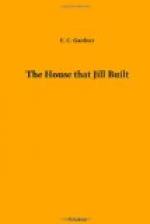“Not so much as we used to. The women folks think they must have it to cook with, but we use coal a good deal in the winter.”
“Don’t you have fireplaces?” was the next innocent question.
“Plenty of ’em in the house, but they’re mostly bricked up. It takes too big a wood pile to keep ’em going.”
“So you use stoves instead; I suppose it is less trouble. Oh, and that reminds me, have you any old andirons, anywhere around?”
“Shouldn’t be surprised if there was. Yes, there’s one now, hangin’ on the gate right behind you.”
Bessie, as she afterwards declared, was almost ready to faint at this announcement, but on turning to look she saw indeed, hanging by a chain to keep the gate closed, a dumpy, rusty, cast-iron andiron.
“Should you be willing to sell it for old brass? Isn’t there a mate to it somewhere? They generally go in pairs, don’t they?”
“No, I shouldn’t want to sell it for old brass, because you see it’s iron. Most likely there was a pair of ’em once, but there’s no tellin’ where t’other one is now. Maybe in the suller and maybe in the garret.”
“Please could we go up in the garret and look for it? We will be very careful.”
The worthy man, considerably puzzled to know what sort of angels he was entertaining unawares, obtained permission from the “women folks,” sent a boy off with the jug of drink and showed his callers to the topmost floor of the house.
“Oh, oh! If there isn’t a real spinning-wheel. This passes my wildest anticipations,” murmured Bessie to Jim; then, restraining her enthusiasm for fear of spoiling a bargain, she inquired aloud: “Do any of your family spin?”
“No, no; not now-a-days. My old mother vised to get the wheel out now and then, when I was a youngster, but it’s broke now and part of it is lost.”
“Would you sell it?”
“If it isn’t all here—” Jim began, but Bessie checked him and eagerly accepted the old wheel, which had lost its head and two or three spokes, for the moderate sum of one dollar.
Rummaging among old barrels, Jim found the missing half of the pair of andirons. One broken leg seemed to add to its value in Bessie’s eyes and she quickly closed a bargain for them at fifteen cents, which their owner, after “hefting” them, “guessed” would be about their value for old iron. One old chair, minus a back and extremely shaky as to its legs, and another that had lost a rocker and never had any arms, were secured for a nominal price, and Bessie’s attention was then attracted to a tall wooden vessel hooped like a barrel, but more slender, “big at the bottom and small at the top,” which proved to be an old churn. Jim objected to this until his companion explained how it could be transformed by a judicious application of old gold and crimson into a most artistic umbrella stand, while the “dasher” would make a striking ornament for the hall chimney-piece. As they were about to depart with their treasures, the honest farmer invited them to look at a ponderous machine five or six feet high and nearly as broad—a horrid monster, misshapen and huge, that stood in the back chamber over the wood-shed. It was a cheese-press. “How magnificent!” whispered Bessie, and then, turning to their host, inquired—“Do you use it every day?”




